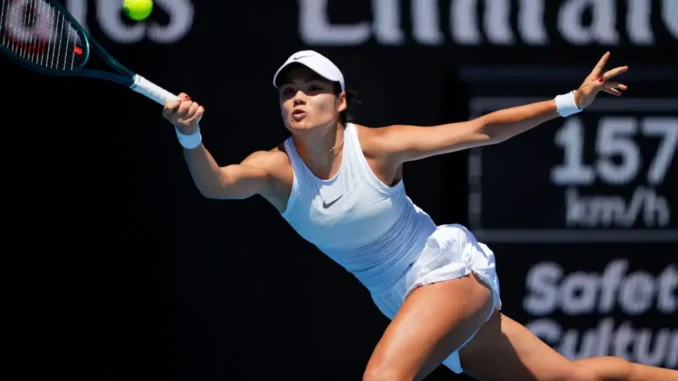
Raducanu’s Paradox: Navigating Criticism While Charting Her Own Course
Emma Raducanu’s journey in professional tennis has been a whirlwind of soaring highs and frustrating lows. From her stunning US Open triumph to subsequent struggles with form and injuries, the young British star has faced intense scrutiny and often contradictory advice from pundits and fans alike. It’s a challenging tightrope to walk: trying to heed the feedback while staying true to oneself and one’s own vision for their career. Interestingly, recent observations suggest Raducanu has indeed been incorporating some of the suggestions offered by her critics, yet she still finds herself under fire. This paradox raises questions about the nature of criticism, the pressures faced by young athletes, and the complex path to finding consistency and success in the demanding world of professional tennis.
Raducanu’s ascent to stardom was meteoric. Her unexpected victory at the US Open, a fairytale run that captured the hearts of a nation, catapulted her into the global spotlight. Suddenly, she was a household name, her every move dissected and analyzed. Along with the adulation came a barrage of advice, often conflicting, from commentators, former players, and armchair experts. Some urged her to focus on building a solid foundation, playing more tournaments, and honing her skills. Others suggested she needed a more structured coaching setup, a stronger emphasis on fitness, or a different approach to managing the pressures of fame.
“It’s a lot to take in,” Raducanu commented shortly after her US Open win, acknowledging the whirlwind of attention and advice that surrounded her. She spoke of her desire to learn and grow as a player, but also her need to stay true to herself and her own instincts. This balancing act, between listening to external feedback and trusting her inner compass, has been a constant theme in her career since that momentous victory.
One common criticism leveled against Raducanu was the perceived instability in her coaching arrangements. She was often seen as switching coaches frequently, leading some to suggest she needed a more consistent and long-term partnership to develop her game effectively. Recent observations, however, indicate a greater degree of stability in her coaching setup, suggesting that Raducanu has taken this particular piece of advice to heart. “I’m working with a great team,” she affirmed, highlighting the support and guidance she receives from her coaches and trainers. This stability, while a positive step, hasn’t shielded her from further criticism.
Another area of focus for commentators has been Raducanu’s tournament schedule. Some felt she wasn’t playing enough consistently, while others suggested she was perhaps overplaying and risking burnout. Finding the right balance between competition and rest is a delicate art, and it’s something that even seasoned professionals struggle with. Recent changes to her schedule suggest she is actively working on finding that balance, but the results haven’t always translated into consistent on-court success. “I’m learning all the time,” Raducanu has said, emphasizing her ongoing process of adaptation and refinement. This learning process, it seems, extends beyond just her tennis skills to include the crucial aspects of managing her schedule and workload.
Despite these efforts to address the criticisms leveled against her, Raducanu continues to face scrutiny. This raises questions about the nature of criticism itself. Is it always constructive? Is it always fair? And how can a young athlete, navigating the complexities of professional sport, effectively filter the noise and focus on what truly matters? “I’m just trying to focus on my game,” Raducanu has stated, reflecting her determination to block out distractions and concentrate on the things she can control.
The pressure on young athletes, particularly those who achieve early success, is immense. They are expected not only to perform at the highest level but also to handle the off-court pressures of fame, endorsements, and public scrutiny. It’s a heavy burden to carry, and it’s perhaps not surprising that many young stars struggle to maintain consistency in such an environment. “It’s not always easy,” Raducanu has admitted, acknowledging the challenges of navigating life in the public eye.
Raducanu’s situation highlights the complex interplay between external expectations and internal drive. While listening to feedback can be valuable, ultimately, it’s the athlete’s own vision and determination that will guide their path. “I know what I want to achieve,” Raducanu has asserted, underscoring her commitment to her own goals and her belief in her potential. This inner drive, combined with her willingness to learn and adapt, will be crucial as she continues to navigate her career.
The journey of a professional athlete is rarely linear. There will be ups and downs, triumphs and setbacks. Emma Raducanu’s career is still in its early stages, and she has plenty of time to develop and grow, both as a player and as a person. The criticism she faces, while sometimes harsh, is part of the landscape of professional sport. The key for Raducanu is to continue learning, to continue working hard, and to stay true to herself, regardless of the external noise. Her talent is undeniable, and her potential remains immense. As she continues to evolve and mature, she will undoubtedly find her own path to success, even if that path is not always smooth or predictable. The next chapter of her career is yet to be written, and it promises to be a compelling story.
Leave a Reply